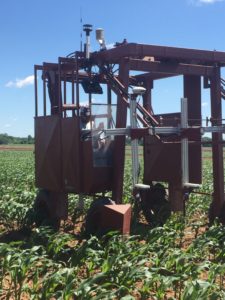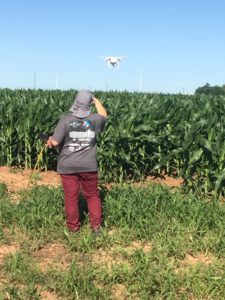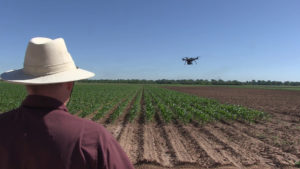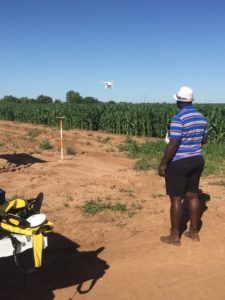AgriLife Research receives USDA-NIFA grant for phenotyping tool development
Analytical tool research will aid screening of potential corn lines
Writer: Blair Fannin, 979-845-2259, [email protected]
Contact: Dr. Seth Murray, 979-845-3041, [email protected]
COLLEGE STATION – Texas A&M AgriLife Research will receive $490,000 over a three-year period as part of an unmanned aerial vehicle, or UAV, project grant to develop analytical tools and determine if these can help select superior corn varieties.
The U.S. Department of Agriculture-National Institute of Food and Agriculture has awarded the grant funds, which will build upon data collected over the past two years using both fixed-wing and copter UAV and ground vehicle data.

“We are extremely pleased to have been awarded this grant, and it will build upon an already well-established UAV program with activities ongoing throughout Texas,” said Dr. Craig Nessler, AgriLife Research director in College Station.
The goal of the project is to develop analytical tools plant breeders and researchers can use for phenotyping, or measuring physical characteristics of plants. This will be tested in hybrid corn varieties to better predict height, yield and different varieties susceptibility to drought and other plant stresses during the growing season, according to researchers.
The hybrids will be from the Genomes to Fields project, a nationwide research effort led and supported by corn producer boards, including the Texas Corn Producers Board, to support translation of maize genomic information for the benefit of growers, consumers and society.
“These grant funds will allow us to develop analytical tools needed by field breeding and genetics programs to screen and select superior genetics in breeding hybrid lines that ultimately will increase yields for farmers nationwide,” said Dr. Seth Murray, AgriLife Research corn breeder in College Station.
Murray is joined by fellow Texas A&M researchers Dr. Dale Cope, who specializes in research and development of UAVs in the College of Engineering, and Dr. Sorin Popescu and postdoc Dr. Lonesome Malambo, both with AgriLife Research, who specialize in remote sensing applications in the department of ecosystem science and management. All are based in College Station.
According to past research in Texas, strong positive correlations between terminal plant height and yield, previously identified in commercial and breeding hybrids in Texas, are likely due to vigor and stress tolerance, not maturity and shading. High throughput field phenotyping will assist in measuring plant growth over time which will help to identify different types of stress tolerance across genotypes for development of more stress tolerant corn.
“The proposal addresses germplasm enhancement and breeding selection theory priority areas,” Murray said.
For more information about the Texas A&M research program, visit http://uasag.tamu.edu/.





